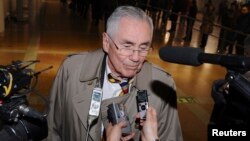Former U.S. ambassadors and experts have expressed confidence about the U.S.-South Korea alliance despite an attack on the U.S. envoy to South Korea by a radical activist.
This week, U.S. Ambassador Mark Lippert was slashed on face and wrist by an assailant while attending an event in Seoul. He was treated at a local hospital and is expected to be released soon.
U.S.-South Korea relations “are in no danger at all. They will become stronger,” Donald Gregg, who served as Washington’s envoy to Seoul from 1989 to 1993, said in a phone interview with the VOA Korean service.
Kathleen Stephens, U.S. ambassador to South Korea from 2008 to 2011, agreed. “I have to think it’s not going to have a huge effect," she said. "The relationship is deep and a very strong one.”
Burwell Bell, former commander of U.S. forces in South Korea from 2006 to 2008, said the two nations have common values.
“We share the same ideals, the same democratic processes, the same love for freedom and liberty and the same perspective of governance,” he said.
The general added that the attack was an isolated incident and it was not representative of the South Korean public.
“I am very confident that any anti-American sentiment that exists in South Korea is also overall appalled by this kind of heinous act,” Bell said.
The motive of the attack remains unknown. But the assailant, Kim Ki-jong, was described as a political activist influenced by radical nationalism by his associates. He shouted slogans protesting joint military drills by Washington and Seoul after the attack.
Pyongyang has often protested against the annual military exercise. In an apparent attempt to stir opposition to the exercise, Pyongyang praised the attack on the ambassador, calling it a valid “expression of resistance” by the South Korean public.
Kim has a long history of violence. In July 2010, he threw pieces of concrete at the Japanese ambassador to South Korea during a speech event in Seoul. The ambassador was not hurt, and Kim received a three-year suspended sentence. Some experts warned against “lenient” punishment for his attack on the U.S. ambassador.
“I would caution that that should not happen again,” said Larry Niksch, affiliated adviser at the Center for Strategic & International Studies, in reference to the punishment Kim received for the 2010 attack.
Niksch warned that such treatment for Kim would draw “negative reaction” from the U.S.
South Korean police charged Kim with a series of crimes, including attempted murder. Police are also looking into possible links between Kim and North Korea.
William Kim contributed to this report.




